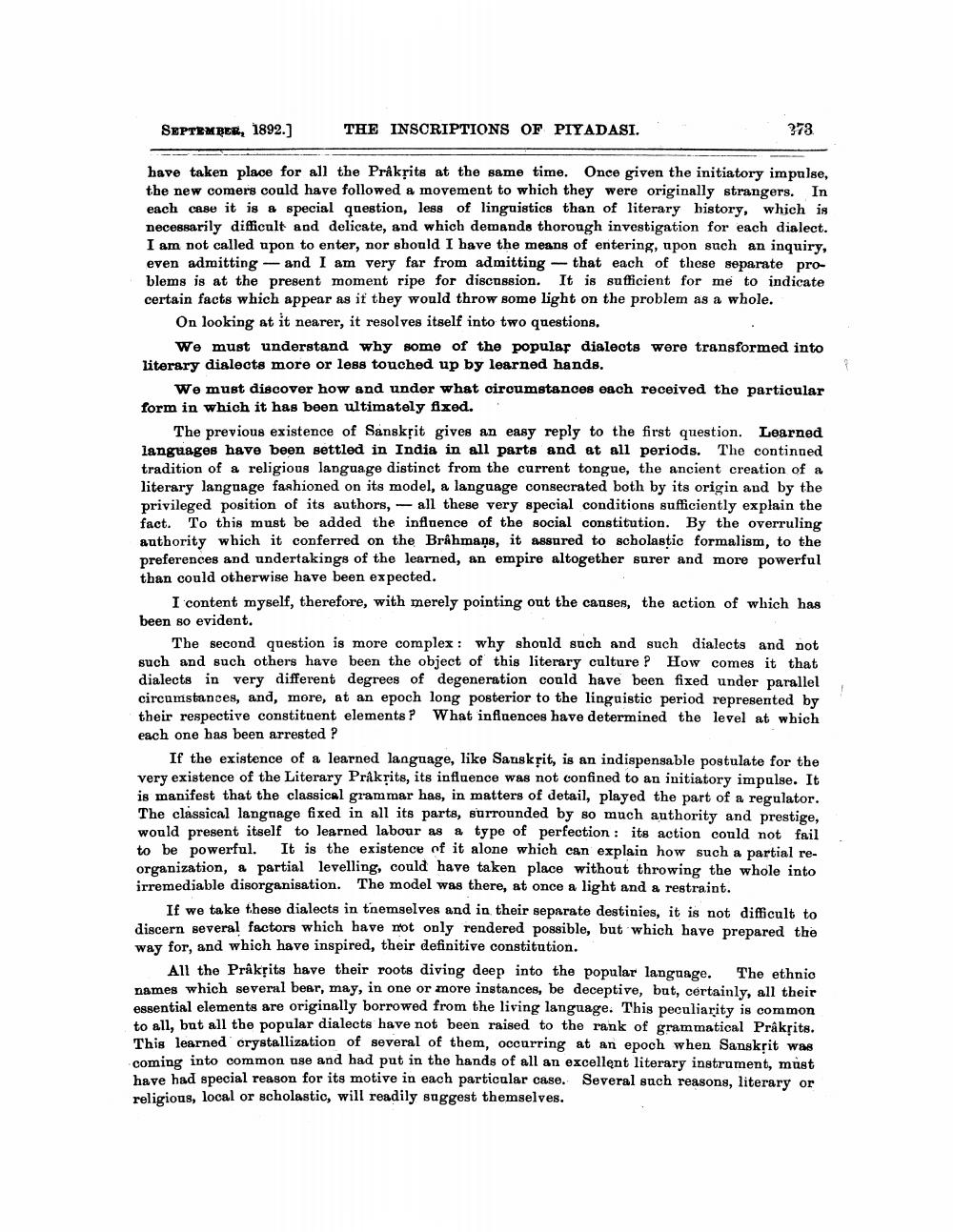________________
SEPTEMBER, 1892.]
THE INSCRIPTIONS OF PIYADASI.
373
have taken place for all the Prakrits at the same time. Once given the initiatory impulse, the new comers could have followed a movement to which they were originally strangers. In each case it is a special question, less of linguistics than of literary history, which is necessarily difficult and delicate, and which demands thorough investigation for each dialect. I am not called upon to enter, nor should I have the means of entering, upon such an inquiry, even admitting - and I am very far from admitting that each of these separate problems is at the present moment ripe for discussion. It is sufficient for me to indicate certain facts which appear as if they would throw some light on the problem as a whole.
On looking at it nearer, it resolves itself into two questions.
We must understand why some of the popular dialects were transformed into literary dialects more or less touched up by learned hands.
We must discover how and under what circumstances each received the particular form in which it has been ultimately fixed.
The previous existence of Sanskrit gives an easy reply to the first question. Learned languages have been settled in India in all parts and at all periods. The continged tradition of a religious language distinct from the current tongue, the ancient creation of a literary language fashioned on its model, a language consecrated both by its origin and by the privileged position of its authors, - all these very special conditions sufficiently explain the fact. To this must be added the influence of the social constitution. By the overruling authority which it conferred on the Bråhmang, it assured to scholastic formalism, to the preferences and undertakings of the learned, an empire altogether surer and more powerful than could otherwise have been expected.
I content myself, therefore, with merely pointing out the canses, the action of which has been so evident.
The second question is more complex : why should such and such dialects and not such and such others have been the object of this literary culture P How comes it that dialects in very different degrees of degeneration could have been fixed under parallel circumstances, and, more, at an epoch long posterior to the linguistic period represented by their respective constituent elements ? What influences have determined the level at which each one has been arrested ?
If the existence of a learned language, like Sansksit, is an indispensable postulate for the very existence of the Literary Prakrits, its influence was not confined to an initiatory impulse. It is manifest that the classical grammar has, in matters of detail, played the part of a regulator. The classical langnage fixed in all its parts, surrounded by so much authority and prestige, would present itself to learned labour as a type of perfection: its action could not fail to be powerful. It is the existence of it alone which can explain how such a partial reorganization, a partial levelling, could have taken place without throwing the whole into irremediable disorganisation. The model was there, at once a light and a restraint.
If we take these dialects in tnemselves and in their separate destinies, it is not difficult to discern several factors which have not only rendered possible, but which have prepared the way for, and which have inspired, their definitive constitution.
All the Prakrits have their roots diving deep into the popular language. The ethnic names which several bear, may, in one or more instances, be deceptive, but, certainly, all their essential elements are originally borrowed from the living language. This peculiarity is common to all, but all the popular dialects have not been raised to the rank of grammatical Prakṣits. This learned crystallization of several of them, occurring at an epoch when Sanskrit was coming into common use and had put in the hands of all an excellent literary instrument, must have had special reason for its motive in each particular case. Several such reasons, literary or religious, local or scholastic, will readily suggest themselves.




